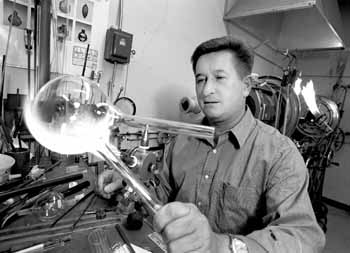

Georges Kopp: Firing chemistry's glass
As Georges Kopp leads a visitor on a tour of the Otto Maass Chemistry Building, it's with an obvious sense of pride. In just about every corner of every lab, one can readily glimpse ample evidence of Kopp's importance to his department.
Glass instruments of all conceivable shapes and designs  the tools that make chemical experiments possible the tools that make chemical experiments possible  fill the labs and chances are that Kopp has either repaired or created each one. He is the chemistry department's glassblower and, according to the department's chair, Professor Ian Butler, life would be pretty difficult without him. fill the labs and chances are that Kopp has either repaired or created each one. He is the chemistry department's glassblower and, according to the department's chair, Professor Ian Butler, life would be pretty difficult without him.
"Glass is what a chemist survives on," explains Butler. "It's a crucial part of all our research." Smooth, transparent, durable, easily sterilized and, in the hands of a skilled glass-blower like Kopp, infinitely malleable, glass is the medium of choice for chemists as they introduce gases and liquids to other gases and liquids and then observe the results.
"Georges's forte is in building special equipment. He has come up with some highly sophisticated items for us. In some cases, they were things we just couldn't buy commercially because they didn't exist until he made them."
That's the part of the job that Kopp lives for. "I love working on design  it's why I stay here. This job changes every year because we always get new graduate students with new ideas for experiments and those experiments each require their own custom-built instruments. it's why I stay here. This job changes every year because we always get new graduate students with new ideas for experiments and those experiments each require their own custom-built instruments.
"Students come to me with sketches of what they want me to make. Or I'll do all the designing myself after we talk over what they'll need for their experiments. I've invented forms of glassware that people now use all over the world."
Only a handful of trade schools teach glassblowing in North America  there are far more opportunities for learning the skill in Europe where the French-born Kopp was schooled. After apprenticing in Europe, Kopp traveled to Canada where he found work in a company that eventually shut down. Then he arrived at McGill to begin a 25-year stay. there are far more opportunities for learning the skill in Europe where the French-born Kopp was schooled. After apprenticing in Europe, Kopp traveled to Canada where he found work in a company that eventually shut down. Then he arrived at McGill to begin a 25-year stay.
Butler says most large university chemistry departments have a glassblower on staff. "The bigger departments have at least two."
Kopp says it's easy to understand why when one considers how much it would cost universities to keep buying new pieces of equipment instead of repairing broken instruments on-site. "A vacuum line can cost $3,000  that's just one piece." that's just one piece."
In his basement workshop, Kopp, who listens to opera and classical tapes as he toils, gives a brief demonstration of his work.
Grasping a glass tube, Kopp places it under the intense heat of a blowtorch. As the blue flame licks one end of the glass, he places his lips on the other side and blows  the portion being heated swells into a circular shape. Using a pick, Kopp gently pokes a hole into the fat end of the tube the portion being heated swells into a circular shape. Using a pick, Kopp gently pokes a hole into the fat end of the tube  still soft from the heat still soft from the heat  and uses the blowtorch to weld it to another piece of glass. He's finished in a flash. and uses the blowtorch to weld it to another piece of glass. He's finished in a flash.
His projects range from 10-minute repair jobs to large-scale constructions that can take months to complete. He likens himself to a film director when he prepares for some of his more complicated tasks. "If you lose your concentration for a second, the glass can break. When you're working on something very complicated with many different pieces, you don't want that to happen  a lot of work can go to waste. So I'll have all my pieces lined up very carefully and I'll quickly go from one to another, attaching and weldingÉ" a lot of work can go to waste. So I'll have all my pieces lined up very carefully and I'll quickly go from one to another, attaching and weldingÉ"
Glass begins to melt at temperatures of 1000 degrees Celsius. Kopp often dons two labcoats and a pair of asbestos gloves to get his work done.
"In February, when it's freezing everywhere else, it's nice and toasty in here," he says with a smile. "I get more visitors in the colder months."
Daniel McCabe
| 


